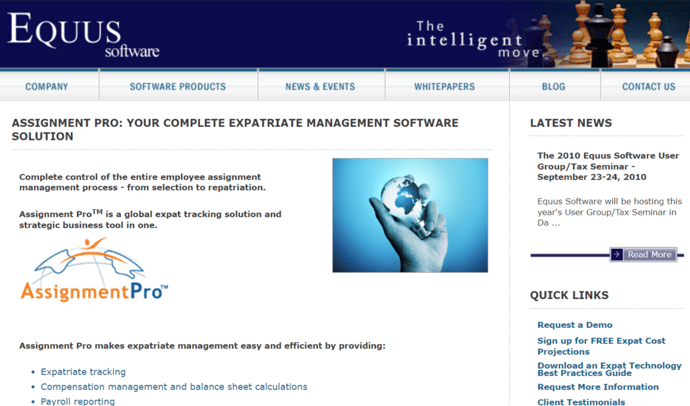Share this
The Evolution of Global Mobility: Past, Present, and Future Trends
by Clive Fathers on May 5, 2023 12:46:53 PM
In a world that is increasingly interconnected and globalized, the management of a globally mobile workforce has become a crucial element of business strategy. From traditional long-term assignments to virtual and remote work arrangements, the landscape of global mobility is constantly evolving, shaped by both internal business needs and external factors such as technology and the COVID-19 pandemic. In this news and knowhow, we will explore the evolution of global mobility, current trends in the industry, and the challenges that lie ahead for global mobility teams.
The Evolution of Global Mobility
Before we look at the current trends in global mobility, it is worth looking back over recent history, to identify how the management and structuring of international assignments has changed. Is there anything that we can learn from the evolution of Global Mobility?
Back in the 80s..

Going back to the 1980’s 🦖, the world of global mobility was relatively straight forward. Moves were called assignments. They typically fell into two categories, those to aid personal / career development and, perhaps more commonly, those that were driven by business need, for example skills required for a specific project in a different country or transferring knowledge in a new market.
Most assignments used the traditional balance sheet approach ⚖️, which included paying assignment related allowances with gross-ups, hypothetical tax, or net pay arrangements.
It wasn’t unusual for people to remain “on assignment” for many years, on all of those allowances. 💰💰😁
The ability to track people was such that sometimes it seemed as though people had been “forgotten about” – stories of expats who started life in one location and were “discovered” ten years later elsewhere still on full assignment allowances were not uncommon!
By the 90s..
By the 1990’s more businesses were starting to focus on the cost of these assignments and we saw the introduction of a “laisse faire” approach, where some companies just gave employees a lump sum and told them to work everything out for themselves.
This attempt to create less rigidity and reduce costs, created huge business risks – some employees didn’t understand the local withholding and reporting requirements, resulting in compliance challenges for the employer. Others would live in inappropriate, and sometimes unsafe, accommodation, so that they could retain more of the cash for themselves ⛺.
Technology starts to enable

Moving into the 2000s , technology started to be seen as a potential enabler, some software companies started to create mobility programs.. on CDs. And many businesses started using spreadsheets to track and manage assignments. However, the laissez-faire approach was still creating too much business risk. Companies were looking for other ways to manage costs, and we saw the emergence of "local plus" assignment packages. Employees would be transferred onto a local contract, with a few additional allowances, such as housing, as part of the package while they settled in. Career expats were becoming less common.

As we moved into the 2010s, technology was making it much easier to track and manage assignments. Robust technology solutions were introduced into the market, which, for those who could afford them, really transformed the way in which global mobility was managed. However, trying to manage employees while they worked overseas continued to be a challenge. Taxing authorities became more focused on collecting the additional revenue that globally mobile people working in their country generated, and employees felt nervous about being "spied on" by their employers.
The Impact of COVID-19

The COVID-19 pandemic has had a significant impact on global mobility. With remote work becoming the norm, many employees found themselves working from overseas locations, leading to the emergence of the concept of working from anywhere. While some businesses are returning to their less flexible ways 🚫🏝️ and asking employees to return to the office, others are embracing flexible working, allowing their employees to work from anywhere as long as they can do their job effectively without creating additional risk or costs for the employer.
With many countries advertising "digital nomad" visas to attract people, there is an increasing trend of employees requesting to work from overseas locations. However, these shorter types of moves can often be more complicated, as the employee may still be liable to tax in their home country while also potentially becoming liable to tax in the overseas location.
The Future of Global Mobility: Lessons Learnt
Looking back at the evolution of global mobility, there are lessons to be learned to inform and shape the management of international moves in the future.
- Formal Assignments: While there is still a place for “formal” assignments, where there is a specific business need, these types of assignments are declining, and the business case must be robust to support them. They may be shorter, and less generous in terms of packages paid.
- Structure and Guidance: Some structure and guidance is needed, in the form of a policy, principles or guide, to ensure that employees do not create unintended issues for their employer and protect them from themselves.
- Creative Planning: Being creative and planning in advance can help make the cost of assignments manageable and enable businesses to tap into the many benefits of having a globally mobile workforce.
- Working from Anywhere: Accommodating some form of working from anywhere into policies will become the norm. Those who move first will have an advantage when it comes to attracting and retaining the best people. It may also have a positive impact on Diversity and Inclusion goals. Embracing remote working opens up opportunities for those in the workforce who may have caring responsibilities or disabilities that prevent them from traveling to an office on a regular basis. Working in a different country can have a hugely positive impact on understanding cultural differences, which should be embraced.
- Technology: Technology can play a massive role in enabling flexibility and managing risks, plus it is becoming more affordable and easier to plug and play.
And finally, a new challenge on the horizon for Global Mobility teams. How do businesses enable a globally mobile workforce, as well as reducing CO2 emissions, as part of their ESG goals? That’s a topic for another day.

No Comments Yet
Let us know what you think